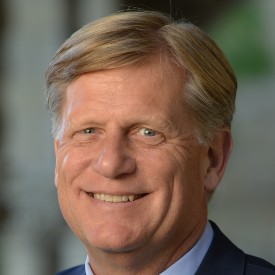Below, co-authors Ulrik Juul Christensen and Tony Wagner share five key insights from their new book, Mastery: Why Deeper Learning Is Essential in an Age of Distraction.
Ulrik is founder and CEO of Area9 Lyceum. Formerly a member of the McGraw Hill executive board, he is a frequent keynote speaker and regular contributor to Forbes. He also serves on several boards including the Technical University of Denmark.
Tony is senior research fellow at the Learning Policy Institute and former codirector of Harvard Graduate School of Education’s Change Leadership Group. He is the bestselling author of Creative Innovators and The Global Achievement Gap.
What’s the big idea?
In a world where AI can deliver information faster and more accurately than any human, what matters most are the uniquely human skills of critical thinking, communication, creativity, collaboration, and character. This is why we need to replace our outdated, time-based education model with a mastery-based approach. The future of learning depends on a ground-up redesign of our standards, metrics, and methods in the classroom.

1. The core purpose of education should be to develop the skills of mind and heart necessary for productive work, active citizenship, and personal health and well-being.
Our current education system is far too focused on information retention and recall—things that AI can do far better than any human being—and failing to develop our uniquely human skills. The world simply no longer cares how much students know. What matters far more is what they can do with what they know.
A woman named Monique Little did everything society told her to do to succeed. She worked hard in high school, earned a bachelor’s degree from a good college, and yet, she was stuck in a series of dead-end, low-wage jobs because she lacked “marketable skills.” In fact, 45 percent of recent college graduates are underemployed, working in jobs that don’t even require a bachelor’s degree. Monique told us that she had come to see her degrees as no more than “certificates of attendance.” She told us that she learned far more technical and people skills in 10 weeks at a non-profit training program called Per Scholas than in all her years of schooling, which is what enabled her to land a great new job as an internet threat analyst for a startup.
2. We must abandon the traditional, time-based model of learning.
Progress should be based on clear evidence of mastery, not on arbitrary measures, like Carnegie units. The Carnegie unit, which defines a course as 120 hours of seat time, was established more than a century ago. This system, along with its reliance on multiple-choice tests, is fundamentally flawed. It leaves many students behind who simply need more time to master a subject.
“This system, along with its reliance on multiple-choice tests, is fundamentally flawed.”
We offer an inspiring alternative: performance assessments. Schools in Allen County, Kentucky, are holding “defenses of learning” where middle schoolers publicly present and defend their work to community members. This shifts the focus from passive memorization to active demonstration of skill and understanding. This kind of authentic, public assessment not only motivates students but also gives the community a clear, face-to-face sense of what their students can truly do.
3. Tapping into students’ intrinsic interests and passions motivates them.
Rote learning and external rewards and punishments (like grades) are not enough and lead to increasing levels of student disengagement and anxiety in schools.
We provide a fantastic example from a program called the Center for Advanced Professional Studies, or CAPS. A student named Antonio Linhart entered the program interested in game design. CAPS didn’t force him down a predefined path; instead, it helped him apply his passion to real-world projects, including a client project, a community outreach project, and a personal passion project. This process of connecting his interests to meaningful, hands-on work sparked his curiosity and led him to discover new career paths in computer science that he didn’t know existed.
We also saw this idea in practice at Red Bridge School, where a group of young girls interested in fashion created clothing designs based on their curiosity about roly-poly bugs. This kind of learning is foundational to creativity and mastery of skills.
4. A personalized approach is essential in mastery-based learning.
Nearly everyone can achieve high levels of mastery, but not everyone learns at the same pace. We bring this idea to life with a powerful story from the world of adult learning, specifically from the Danish road-safety certification organization, VEJ-EU. This program trains a diverse group of workers, from civil engineers with advanced degrees to laborers who didn’t finish high school, all of whom must pass the same proficiency-based certification exam.
“True education is not a race.”
Instead of a one-size-fits-all class, they developed a personalized, computer-based learning system that allows individuals to progress at their own speed. The program proved that all learners could achieve the required mastery, even though the slowest learners might need ten times as long as the fastest ones. True education is not a race. It’s about providing the time and support necessary for every individual to reach a defined standard of competence.
5. This new model of learning requires educators to be sources of inspiration.
Teachers must become performance coaches, guides, and mentors who know and support their students. In Finland, a country whose education system is often praised globally, aspiring teachers enter a master’s degree program where they spend a full year with a master teacher and a team of peers. They regularly observe each other’s classes, debrief on their practice, and collaboratively refine their lesson plans.
This model, rooted in collaboration and continuous feedback, transforms teaching from an isolated profession into a community of practice dedicated to improvement. This systemic, mastery-based approach to teacher training is what has enabled Finland to consistently achieve excellent and equitable education outcomes. It’s a stark contrast to the conventional “conference, observe, conference” model that is still common in many teacher preparation programs today.
Enjoy our full library of Book Bites—read by the authors!—in the Next Big Idea App:






























